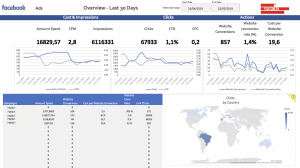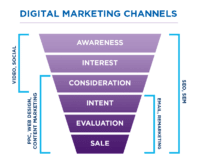There is no question that social media is a vital part of today’s e-commerce and a powerful tool for selling products and services to a specific audience or population. You can reach your audience by this media in a growing number of ways, including major websites such as Facebook, Twitter, LinkedIn, YouTube and others. Online companies are now spending millions of dollars on new customers, growing their brand awareness and increasing sales. Therefore, reports for Facebook marketing is important to test the business model and ensure that your investment produces good returns and new opportunities.
Social media can be difficult to justify in terms of ROI, since determining the usefulness of social media for your company is not a simple process, unlike other marketing companies. There is no clear correlation between how much you spend on social media and an increase in e-commerce; and it is difficult to find useful metrics to quantify this effect. Most current business research models are inadequate to assess the impact of social media on your customer base. Analytics can often be rough or fail to take more nuanced outcomes into account.
Twitter Analytics will tell you in a glance how many messages, profile clicks, likes, mentions and followers you have earned. Facebook analytics offer you page metrics such as the number of posts, comments and clicks of individuals. LinkedIn provides analytical data for corporate pages such as evaluating your messages and providing information on the profiles of your followers.

How to draw out from analytic data
Compare the output of all your corporate social media accounts. The collected statistics will allow you to monitor recent trends, industry standards, interaction and engagement levels.
It won’t help you to collect huge amounts of data from social networks. It is important to choose a resource that can help you get to know the information available. Simply put, you need something that will show your company the economic impact of your marketing efforts. You can start by using resources that are directly located within the social networks themselves.
It is important to track your data so that your campaigns produce better results. You probably waste your time on missing or reaching promotions, if you don’t track the results. Social media analytics is essentially the difference between success and failure to achieve the desired results.
Social media analytics find that any social media site collects data in more than one way. For instance, Facebook records the amount of “loves” reached by a company or event-this interaction is one-way but reveals the audience. When a user makes a message on your Facebook page, the contact starts twice. If this user shares your content or transmits it to his Facebook friends, your potential customer base will be increased. The’ like’ feature, in particular, helps you to determine not only if the frequency of your posts is sufficient but also if your audience receives a positive response.
The number of “friends” you have in your profile is a good indication of brand success and influence. This model does not, however, go on Twitter where the number of followers does not simply reflect the impact of your e-commerce campaign-the content you are tweeting can not be taken into account by your followers. Most crucially, if a consumer recognizes your content as important or relevant, is the amount of “retweets.”



